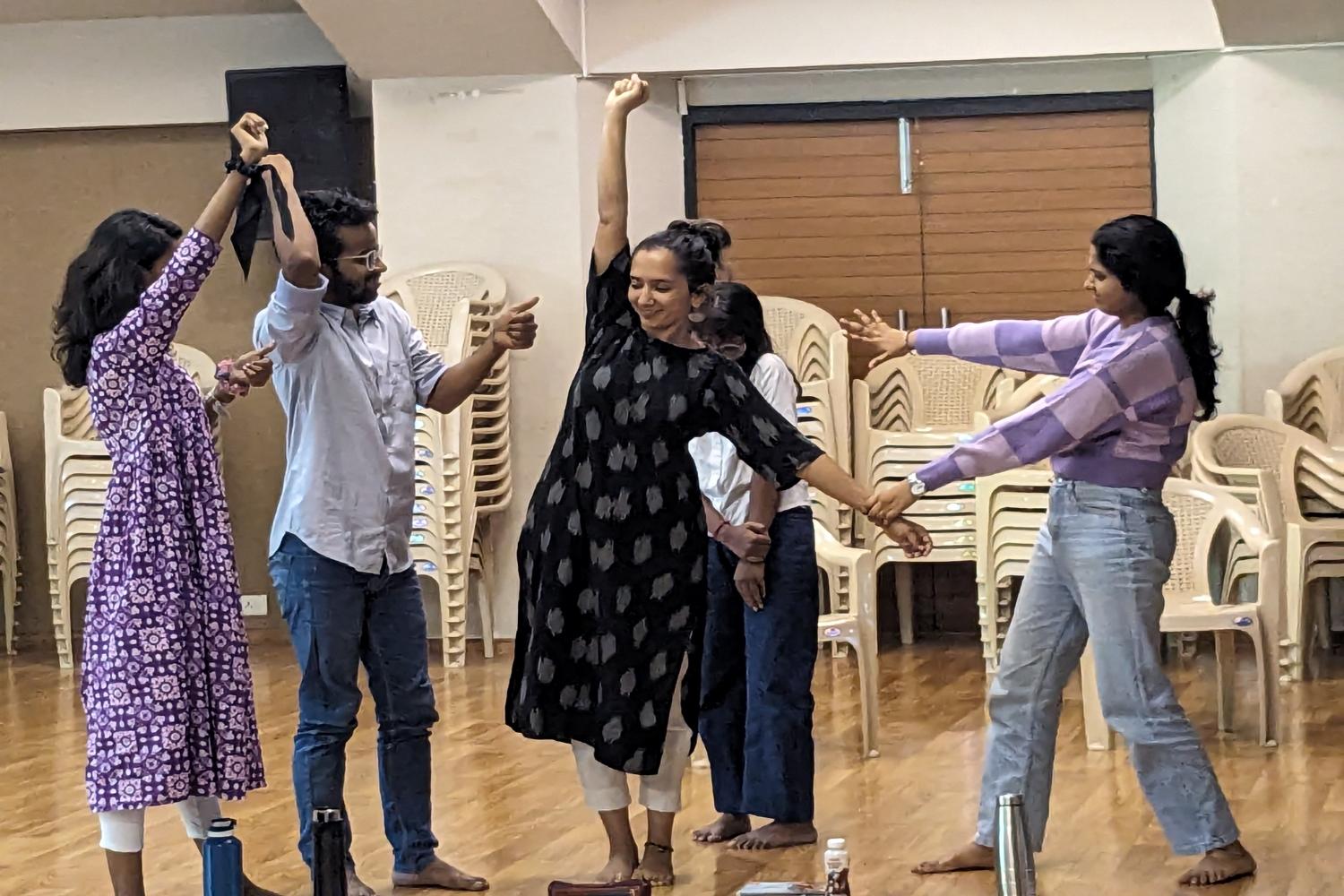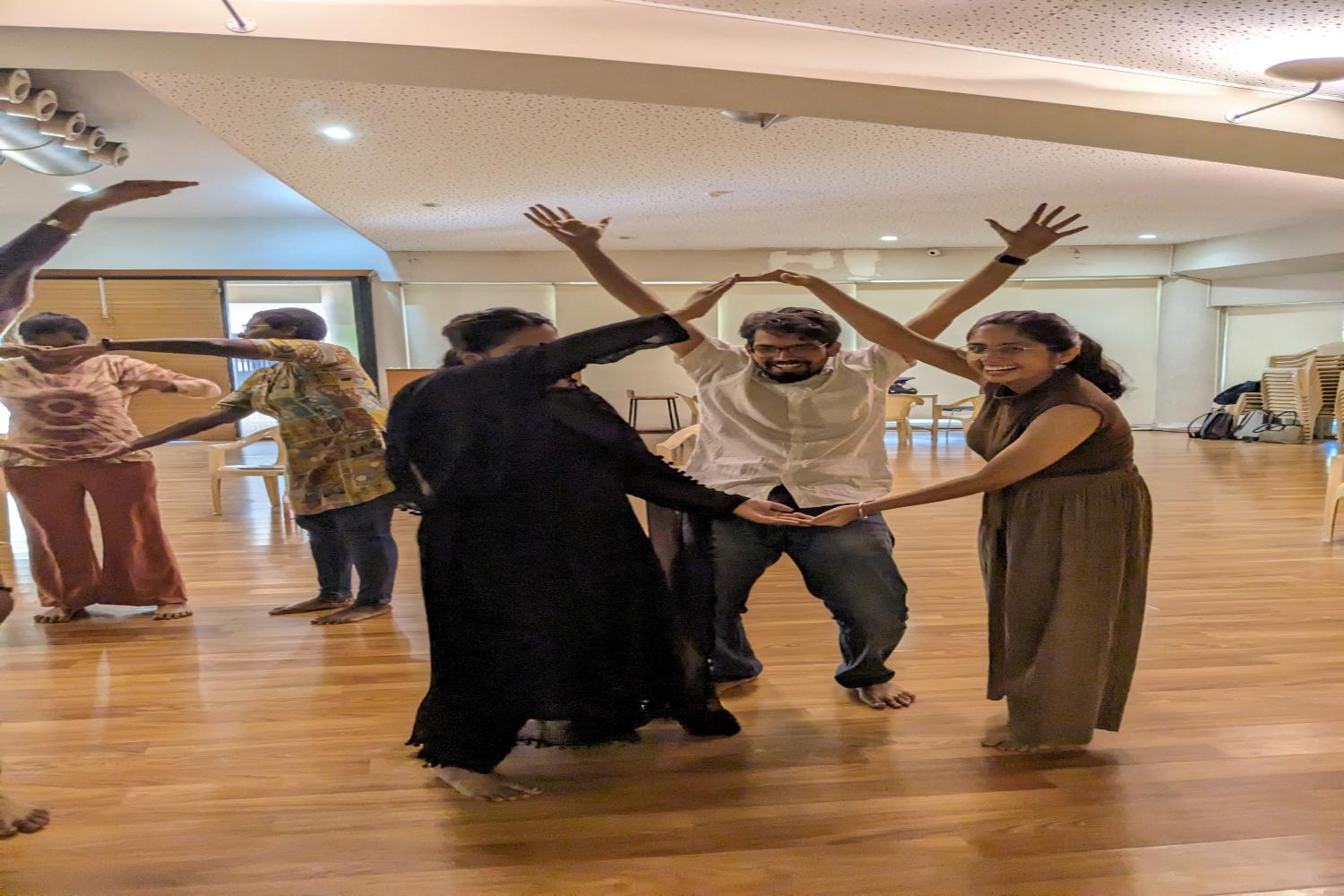People first: Fortifying human capital for grassroots impact at Shiksharth
Ashish Shrivastava shows us how being rooted in self-identified values, and responding to one’s context with sincerity, can help CSOs in fortifying human capital at the grassroots.

People are the key I n 2013, during an encounter with a government teacher in Dantewada, I was told, “You all seem to have excellent programs. But how can we implement them with only two hands?” This sentiment, whether expressed explicitly or implied, became a recurring theme. Government officials and community stakeholders seemed more enthusiastic about partnering with individuals who were willing to work alongside them, rather than merely introducing impressive programs.
This realization became one of the founding principles while setting up Shiksharth in 2015. Working alongside community stakeholders is a central part of our strategy. While funding support is essential for the work, developing long-term advocates for children in conflict zones is paramount.
The essence of a grassroots organization like Shiksharth lies in its community engagement, necessitating a hands-on approach. Recognizing the importance of recruiting committed individuals early on, we understood that merely securing funding was not enough for our mission’s success.
Challenges in team building
Over the past decade, our recruitment efforts for over 5,000 individuals have highlighted three main challenges in building teams in remote areas. These are briefly discussed below.
Lifestyle change: The shift to living in remote, rural, or tribal regions requires significant personal adjustments, deterring many from such commitments.
Desire for systemic transformation: Many young, talented people are more inclined toward systemic change, like policy design, rather than grassroots involvement. This limits the pool of candidates for fieldwork.
Professional stigma: Working in rural or tribal areas is often undervalued. This affects opportunities and perceptions compared to urban experiences. This is so, despite the critical impact of such roles.
These insights shed light on the complex realities of building a committed team in less accessible areas. These also underscore the importance of addressing the challenges to attract and retain talent in the development sector.
Challenges of people practices for a CSO working in a remote geography
Beyond recruitment and induction of team members at Shiksharth, routine people functions, particularly for those based in Sukma, are profoundly affected by a range of challenges. These extend beyond the apparent hurdles associated with operating within a conflict zone. These impact the very fabric of our work and the conditions under which our team members operate.
The challenges outlined below significantly influence our day-to-day operations, the overarching mission, and the effectiveness of our initiatives. They require thoughtful consideration and strategic interventions to ensure the well-being and productivity of our workforce and the successful implementation of our programs.
Capacity building and team performance at Shiksharth: Despite a lack of concrete evidence, a discernible pattern suggests that individuals drawn to grassroots work, particularly in rural or tribal areas, arrive with robust fieldwork skills. However, they often encounter difficulties with program design and strategic thinking. We have observed that our team members excel in community mobilization and implementation tasks. But their programmatic thinking is somewhat limited. This limitation hampers the efficiency of program delivery. It highlights a critical need for enhancing strategic planning and design skills within our grassroots team.
Employee retention: At Shiksharth, a notable challenge has been retaining young professionals who, despite their initial commitment to long-term, grassroots work, find sustaining prolonged engagement in remote areas challenging. The average tenure observed has been of two years. After this period, individuals often depart due to better job prospects or the desire to be closer to home.
This high turnover rate necessitates frequent induction and orientation for new team members. It leads to significant knowledge loss. Recognizing this challenge, we have explored solutions such as offering remote working opportunities to retain talent and mitigate the impacts of frequent transitions.
Employee engagement: Sustaining long-term employee engagement needs innovative and adaptive strategies. This is a critical requirement in remote geographies, where conventional recreational options are limited. At Shiksharth, we recognize that engagement must go beyond the mundane. It has to address the unique needs of team members and the desire for fulfilment and instant gratification prevalent among today’s youth.
To combat this, we continually seek new ways to engage our team. We understand that a dynamic approach is essential for maintaining enthusiasm and commitment. Some of the aspects of such an approach include relaxed work timings, frequent group get-togethers in the form of picnics and sight-seeing, etc.
Social and intellectual isolation: In the secluded geography of our operation, both the founding team and newer members have experienced a sense of intellectual and social isolation. Despite the presence of a supportive community, the craving for intellectually and ideologically aligned companionship remains unmet. This often leads to a sense of loneliness that can demotivate team members.
To address this, Shiksharth has implemented various measures. These include remote work opportunities and engagements with diverse programs to foster social and intellectual connections. However, the challenge of replacing face-to-face interactions with virtual ones persists. We are firmly convinced that the challenges outlined are not unique to Shiksharth. These are shared by many organizations working intensively in rural or tribal settings across a variety of themes and domains.
The importance of value alignment Surprisingly, we have found that the right mindset and personal qualities outweigh skills in importance for impactful work. We prioritize four values that we have found to be critical. These four values are humility, perseverance, the willingness to learn, and skills and competency. This prioritization reflects our belief that enduring and thriving in challenging settings requires more than just talent. It demands patience, humility and perseverance.
The four values/traits we prioritize have led us to pass on some candidates. They had exceptional talent. However, they seemed to lack the patience and perseverance essential for on-the-ground work. Working with a grassroots organization, especially in challenging locations, is often an underappreciated endeavor. Achievements can go unnoticed, far from any spotlight, with success stories being few and far between. Daily, one faces unpredictable challenges, making humility and perseverance both valuable and necessary for enduring and thriving in such an environment.
Developing local talent is crucial but time-consuming. There is thus a challenge in balancing between the need for immediate results and cultivating long-term expertise. Initially, local talent offers vital context and engagement, complemented by external members’ programmatic contributions.
As roles evolve, locals increasingly lead. This needs a development trajectory of around 3 to 5 years. This timeline is often at odds with the current preference for quick outcomes. This necessitates initial reliance on external talent.
Principles and practices for a people-centered human resource strategy for CSOs
Reflecting on the complexities we face, our human resources strategy is aligned with the following principles. These aim at addressing both the needs of our team and our programs’ goals.
Recruitment and induction: We ensure a thorough immersion phase for new recruits.
This allows them ample time to assess their fit for fieldwork before commencing with their specific responsibilities. This phase includes comprehensive discussions with the leadership team.
Our interviews are adaptable. These accommodate different languages. Our questions are also tailored to individual candidates. The selection process begins with an orientation. This provides a deep dive into the organization’s culture and values.
Comfortable living and working conditions: We recognize that finding suitable accommodation and managing daily logistics can be a challenge in the geography we work in.
Therefore, we prioritize providing a supportive environment. This includes quality boarding and lodging options. For example, we offer fully furnished accommodation and kitchen facilities along with a cook for anyone who joins the team.
In addition to this, two-wheelers are made available to all the team members. We have seen this as a gamechanger for people who come with lots of anxiety and concern at the time of joining. Additionally, the organization also offers interest-free loans to team members for any personal emergencies or needs.
Capacity and profile development: Beyond building skills, we focus on enhancing each team member’s career prospect. We try to facilitate this through intentional design in our organizational structure. We support both professional growth and profile enhancement.
In the last three years, our team has attended different capacity building workshops in pedagogy (STEM education, multilingual education, library engagement, leveraging art, writing for children, etc.), leadership development (individual and group), organization development and domain knowledge (gender, menstrual hygeine management, ecology, etc.). We also support mentoring processes for everyone in the team through internal and external mentors.
Well-being support and flexibility: We acknowledge the stress and isolation that can accompany ground-level work. Therefore, we emphasize sincerity over outcome. We strive to create a supportive environment for our team members. They are encouraged to maintain their mental and emotional health.
Relaxation and time-off options are not counted against leave balances. This ensures that well-being is prioritized. Recognizing the need for improvement, we continue to develop support systems for our team members to express themselves and take necessary breaks.
Some of the primary support we provide is in the form of our policy on leaves. We have more than 36 days of leave in a year. Along with that, the policy provisions 4-10 days of work from home for team members who come from outside Sukma.
Team members are free to take days off for simply stepping out. We have also been in touch with counsellors in case any of the team members needs help and support. We have not had any one avail of the services yet though.
One highlight for us has been designing the holiday calendar keeping in mind local context and festivals. This means our local team members get additional holidays depending on different rituals and festivals in their communities.
Multiple levels of check-ins (formal and informal) with co-founders, the operations head, and the program heads help us provide support to our team.
Quality and accountability frameworks: We have tried to implement a system that emphasizes quality and accountability. This helps team members appreciate the impact of their work. They are also able to understand their contributions to our collective goals.
We co-create monthly outcome-based action plans with our team member. These individual action plans are created in alignment with the overall organizational and programmatic goals. This helps the individuals to self-review their work. All our products are peer reviewed along with feedback from the ground to improve the quality.
Leadership development from local talent: We are committed to cultivating leadership within local communities, preparing individuals for roles at various organizational levels. This helps ensure sustainable development and representation. We are working toward a goal of handing over the entire operation to local team members by 2028. We have already identified eight people as potential leaders in the organization. Simultaneously, this academic year, the second line of leadership will be managed by local team members. Adequate program management and task management skills are being introduced to the team.
Acknowledgment of organizational vulnerabilities: We are transparent about our limitations. We advise potential recruits about the realities of working in grassroots settings. This includes managing expectations around compensation. Usually this is sufficient only for basic living costs. We try and prepare them for the possibility of feeling isolated, despite our best efforts to foster a supportive team environment. We believe that individuals who can navigate these challenges with emotional resilience, perseverance and patience are best suited for long-term engagement with our work.
Remote working for long-term employees: After two years, team members who wish to remain with Shiksharth but need to work from remote locations are afforded the opportunity to do so. This helps them maintain their contributions to our vision, while balancing personal commitments.
Expanding remote opportunities: We recognize the need to tap into a broader talent pool. Therefore, we have recently made positions in communications, fundraising, monitoring and evaluation, and content development available for remote work. We have done this with the goal of strengthening our program delivery.
These initiatives underscore our commitment to foster a supportive, flexible and growth-oriented workplace. This is a result of our recognition that the diverse needs and potentials of our team members need to be supported, as we pursue our mission.
Around 70% of our team comes from the local communities. This highlights our commitment to developing local leadership and ensuring our operations are driven by those we serve. We are striving to transition the entire operations to local team members in the next five years. This underscores the importance of patience, listening, and fostering a culture of trust within our organization.
We sincerely believe that our people are our greatest asset. This drives us to address the challenges of human resources management. This effort requires time, commitment, and ecosystem support to transform how solutions are implemented and co-designed, contributing to a broader impact.




No approved comments yet. Be the first to comment!